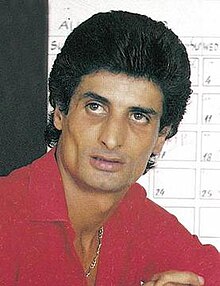Zohar Argov
Zohar Argov | |
|---|---|
 | |
| Background information | |
| Birth name | Zohar Orkabi |
| Born | July 16, 1955 |
| Died | November 6, 1987 (aged 32) |
| Genres | Mizrahi |
Zohar Argov (Hebrew: זוהר ארגוב, born Zohar Orkabi on July 16, 1955, died November 6, 1987) was a popular Israeli singer and a distinctive voice in the Mizrahi music scene. Argov is widely known in Israel as "The king of Mizrahi music"[1][2]
Background
The most serious hurdle on his way to stardom was Argov's socioeconomic background. He was born in Rishon LeZion, and grew up in a poor family, the eldest of ten children.[3] In those years, singers often began their careers by serving as entertainment for military troops, but Argov did not serve in the army. His remarkable singing abilities were cultivated at home, through his participation from early childhood in the singing and chanting of the religious Yemenite community.
Musical career
Argov's debut album Eleanor (1981) featured the title track, "Sod HaMazalot" ("The Zodiac Secret"), and "Mah Lakh, Yaldah?" ("What's With You, Girl?"), a tribute to his ex-wife, Bracha, who remained the love of his life.[4]
While Argov's career was dotted with creative and personal lapses caused by his heroin and crack cocaine addictions, which eventually led to his death at the age of 32,[5][6] his musical achievements overshadowed his personal problems. His ability to sing heartbreaking versions of his songs in live performances, even under the influence of drugs, allowed a blind eye to be turned to his addictive rampages, which ended up destroying his personal relationships.
Popularity and musical style
Argov was among the first singers to achieve commercial and nationwide success in the sphere of Middle Eastern-Mediterranean/oriental (Mizrahi)-style music, despite the fact that his music was not mainstream at the time, and radio stations gave predominance to pop music from overseas. Some believe that the great popularity of Argov and other Mizrahi singers of his time, among them Avihu Medina, Haim Moshe and Margalit Tzan'ani, was a response to the widespread sense among Mizrahi Jews in Israel that they were being discriminated against by the Ashkenazi hegemony.
The themes of Argov's songs were similar to those of American country music: love, heartache, disappointments, joy, addiction. He is considered a prodigy by many in the music business. Arranger and conductor Nancy Brandes, who musically directed many of his recordings, described him as a musical genius: He could make perfect recordings in one take, and when asked to do another take, was able to sing a totally different version just as perfectly. Argov had a remarkable talent for improvisation that respected the spirit of the song while allowing him to leave his personal mark.
Legacy
After his death Argov has continued to retain his undisputed status as "HaMelekh" (the King) of Mizrahi music.[7] In recent years his important contribution to Israeli culture has been widely acknowledged. A mainstream label, Hed Artzi, released a double album of his music, "Zohar Argov: The Best." Argov was the subject of a play mounted at the Cameri Theater in Tel Aviv, and a feature film on his life, named "Zohar," has enjoyed commercial success.[8]
His songs, among them "Perakh BeGani" ("Flower in My Garden"), "Mah Lakh, Yaldah?" ("What's With You, Girl"), "Ba'avar Hayu Zmanim" ("In The Past") and "Badad" ("Alone"), are now Israeli pop classics and an integral part of national culture. Proposals to name streets after him in Rishon Lezion and Tel Aviv were discussed in 2007, amid controversy over the balance between his criminal and artistic reputations.[9]
In 2005, he was voted the 60th-greatest Israeli of all time, in a poll by the Israeli news website Ynet to determine whom the general public considered the 200 Greatest Israelis.[10]
See also
References
- ^ Sephardic and Mizrahi Jewry: from the Golden Age of Spain to modern times. Retrieved August 26, 2011.
- ^ Suicide in the entertainment industry: an encyclopedia of 840 twentieth century cases. 2002. Retrieved August 26, 2011.
- ^ Popular music and national culture ... Retrieved August 26, 2011.
- ^ Mediterranean Israeli Music and the Politics of the Aesthetic. 2010. Retrieved August 26, 2011.
- ^ Mediterranean Israeli Music and the ... April 15, 2010. Retrieved August 26, 2011.
- ^ We look like the enemy: the hidden story of Israel's Jews from Arab lands. Retrieved August 26, 2011.
- ^ [1][dead link]
- ^ Israeli film: a reference guide. Retrieved August 26, 2011.
- ^ Saar, Tzafi (July 26, 2007). "Zohar Argov on the corner of Tupac Shakur". Haaretz. Retrieved October 6, 2007.
- ^ גיא בניוביץ' (June 20, 1995). "הישראלי מספר 1: יצחק רבין – תרבות ובידור". Ynet. Retrieved July 10, 2011.
